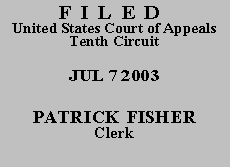

| LORETTA SIMPSON,
Plaintiff-Appellee, v. DENNIE BELLAH; RONNIE FOWLER, Defendants-Appellants. |
|
In this 42 U.S.C. § 1983 action, plaintiff Loretta Simpson alleged a Cotton County, Oklahoma deputy and undersheriff, defendants Ronnie Fowler and Dennie Bellah, violated Simpson's Fourth Amendment rights by using false and misleading information to obtain and then execute a search warrant for Simpson's home. The district court denied Bellah's and Fowler's summary judgment motions, in which they asserted, in part, that they were entitled to qualified immunity. In doing so, the district court held that Simpson's "response to the motions raises sufficient factual issues, at the summary judgment stage, to overcome the assertion of a qualified immunity defense as to actions of the individual defendants." District ct. order (July 17, 2002) at 9. The case then proceeded to trial, where a jury reached a verdict for Simpson against each defendant.
On appeal, Bellah and Fowler argue the district court should have granted their summary judgment motions. "[E]ven if summary judgment was erroneously denied, [however,] the proper redress would not be through appeal of that denial but through subsequent motions for judgment as a matter of law [at or after trial,] . . . and appellate review of those motions if they were denied." Whalen v. Unit Rig, Inc., 974 F.2d 1248, 1251 (10th Cir. 1992). The district court's order denying summary judgment, therefore, is not appealable. See id. at 1250. While this court has "limited Whalen's application to determinations of genuine issue[s] of material fact, . . . [t]hat is precisely what is at issue here." St. Anthony Hosp. v. United States Dep't of Health & Human Servs., 309 F.3d 680, 707 (10th Cir. 2002) (further quotation omitted).
Bellah and Fowler make no other arguments on appeal. The judgment of the United States District Court for the Western District of Oklahoma, therefore, is AFFIRMED.
Entered for the Court
Senior Circuit Judge
*. This order and judgment is not binding precedent, except under the doctrines of law of the case, res judicata, and collateral estoppel. The court generally disfavors the citation of orders and judgments; nevertheless, an order and judgment may be cited under the terms and conditions of 10th Cir. R. 36.3.